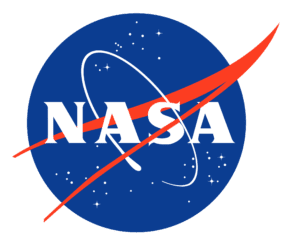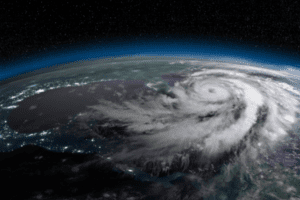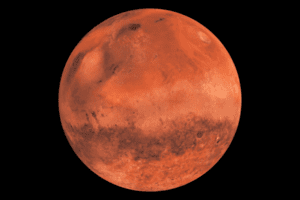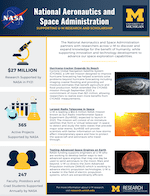National Aeronautics and Space Administration

SUPPORTING U-M RESEARCH AND SCHOLARSHIP


$27 MILLION
Research Supported by NASA in FY21

365
Active Projects Supported by NASA

247
Faculty, Postdocs and Grad Students Supported Annually by NASA
The National Aeronautics and Space Administration partners with researchers across U-M to discover and expand knowledge for the benefit of humanity, while supporting innovation and technology development to advance our space exploration capabilities.
Hurricane-tracker Expands its Reach
 Cyclone Global Navigation Satellite System (CYGNSS), a UM-led mission designed to improve hurricane forecasting has helped scientists solve problems beyond hurricane forecasting including imaging coastal flooding and providing soil moisture estimates that benefit agriculture and food production. NASA extended the CYGNSS mission through September 2023, a commitment of more than $21 million, allowing researchers to realize even more benefits from CYGNSS’ measurements.
Cyclone Global Navigation Satellite System (CYGNSS), a UM-led mission designed to improve hurricane forecasting has helped scientists solve problems beyond hurricane forecasting including imaging coastal flooding and providing soil moisture estimates that benefit agriculture and food production. NASA extended the CYGNSS mission through September 2023, a commitment of more than $21 million, allowing researchers to realize even more benefits from CYGNSS’ measurements.
Largest Radio Telescope in Space
 U-M is leading a $62.6 million NASA mission known as Sun Radio Interferometer Space Experiment (SunRISE), expected to launch in 2023. The mission will consist of six miniature satellites that form a “virtual telescope” in space to detect and study the radio waves that precede major solar events. SunRISE will provide scientists with better information on how storms affect interplanetary space and how to protect the spacecraft and astronauts who travel through.
U-M is leading a $62.6 million NASA mission known as Sun Radio Interferometer Space Experiment (SunRISE), expected to launch in 2023. The mission will consist of six miniature satellites that form a “virtual telescope” in space to detect and study the radio waves that precede major solar events. SunRISE will provide scientists with better information on how storms affect interplanetary space and how to protect the spacecraft and astronauts who travel through.
Testing Advanced Space Engines on Earth
 NASA funding supports engineers at U-M who are working to develop better ways to test advanced space engines that may one day be used to send astronauts to the moon, Mars and beyond. U-M co-directs the Joint Advanced Propulsion Institute (JANUS) which is working to advance electric propulsion technologies. U-M is a leader in the field of electric propulsion systems, which are extraordinarily efficient.
NASA funding supports engineers at U-M who are working to develop better ways to test advanced space engines that may one day be used to send astronauts to the moon, Mars and beyond. U-M co-directs the Joint Advanced Propulsion Institute (JANUS) which is working to advance electric propulsion technologies. U-M is a leader in the field of electric propulsion systems, which are extraordinarily efficient.

